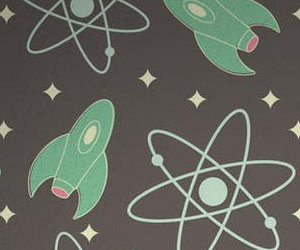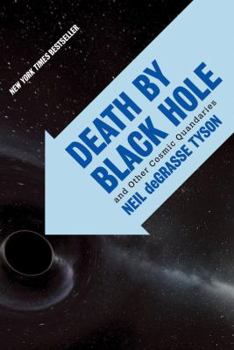Death by Black Hole: And Other Cosmic Quandaries
(Part of the Death by Black Hole: And Other Cosmic Quandaries Series)
Select Format
Select Condition 
Book Overview
Loyal readers of the monthly "Universe" essays in Natural History magazine have long recognized Neil deGrasse Tyson's talent for guiding them through the mysteries of the cosmos with clarity and enthusiasm. Bringing together more than forty of Tyson's favorite essays, ?Death by Black Hole? explores a myriad of cosmic topics, from what it would be like to be inside a black hole to the movie industry's feeble efforts to get its night skies right. One of America's best-known astrophysicists, Tyson is a natural teacher who simplifies the complexities of astrophysics while sharing his infectious fascination for our universe.
Format:Paperback
Language:English
ISBN:0393330168
ISBN13:9780393330168
Release Date:November 2007
Publisher:W. W. Norton & Company
Length:384 Pages
Weight:0.74 lbs.
Dimensions:0.9" x 5.6" x 8.3"
Customer Reviews
3 ratings
Thank supernovas for your existence instead of your mother...
Published by Thriftbooks.com User , 18 years ago
No need for a long review with all sorts of quotes... Death by Black Hole is a great book. Cosmology explained with lots of humor and sarcasm in between. I don't read many books but even I laughed out loud frequently because of his perspective of things in the cosmos. Even most of the (technical) equations are explained in easy to read language. I really enjoyed reading this book and will purchase more of his work as it becomes available.
Entertaining and educational at the same time
Published by Thriftbooks.com User , 18 years ago
Death by Black Hole by Neil Tyson is among the best astronomy related books to appear for some time. In the best traditions of Carl Sagan, another popularizer of things cosmolgical, Tyson does a masterful job at explaining often drab and uninteresting topics in a most excellent manner. Death by Black Hole reminds me of book written by Isaac Asimov nearly thirty years ago, A Choice of Catastrophies. Death has the benefit, however, of thirty years of new information about the cosmos. Consisting of 42 articles that originally appeared in Natural History, Death by Black Hole covers a huge range of topics; everthing from basic astronomy subjects to sophisticated physics topics. The most interesting chapters, in my opinion only are Chapt 7, Planet Parade; Chapt. 11, Antimatter Matters; Chapt 17, Colors of the Cosmos, Chapt 23, Goldilocks and the Three Planets; Chapt 30, Ends of the World; and Chapt 41, Holy Wars. Actually, there isn't a bad read in any of the 42 chapters, but these just seem to stand out. Carl Sagan would have enjoyed Death by Black Holes....maybe he has read it where ever he is at. An excellent book to add to your library.
Accessible and Entertaining Cosmology
Published by Thriftbooks.com User , 18 years ago
Get out your crayons. Make a Sun in the sky. If it is like every Sun you have colored since you were a kid, it is a happy yellow ball. "And I don't care what else anyone has ever told you, the Sun is white, not yellow," writes astrophysicist Neil deGrasse Tyson in _Death by Black Hole and Other Cosmic Quandaries_ (Norton). "If the sun were yellow, like a yellow lightbulb, then white stuff such as snow would reflect this light and appear yellow - a snow condition confirmed to happen only near fire hydrants." How do we keep getting this wrong? Why do people think there is no gravity in space, or that what goes up must come down? How come total solar eclipses seem rare, but actually happen every couple of years? And especially important, how do we obtain those data to show us that these assumptions are wrong? Furthermore, what does happen when you step into a black hole, or into a hole that goes clean through the center of the Earth? What is going to happen when the Andromeda galaxy hits our own Milky Way? ("Gas clouds would slam into each other; stars would be cast hither and yon.. our planet could get flung out of the solar system... That would be bad.") And it is going to happen, but a couple of billion years before that happens, the Sun will explode and die and vaporize all the contents of the Earth. But as Tyson observes, "I'd say we have more pressing issues of survival before us." Tyson's book consists of chapters that appeared as columns in _Natural History_ magazine. There is death and destruction all through it, and yet he writes with buoyant optimism and humor, making even the strangest findings of astrophysics accessible. We have a vast scientific and intellectual tradition, but we have fought against the ideas of one scientist after another who would give us a true picture. At the end of the chapter, Tyson reflects: "What are the lessons to be learned from this journey of the mind? That humans are emotionally fragile, perennially gullible, hopelessly ignorant masters of an insignificantly small speck in the cosmos. Have a nice day." The humor has the ring of truth, but Tyson is no pessimist. We may be slow to learn, but we do know some darned interesting stuff, and his presentation of it, touching on what we know, how we know it, how the universe and the solar system got started and are going to end, and what it all means to humans, is full of admiration for the scientists who got us this far. We are clever, but we are goony. A few years ago, Tyson got a call from a marketing executive who thought it would be a good idea to project her company's logo onto the Moon, and wanted to know how best to do this. Tyson slammed down the phone, but "... called her back and politely explained why it was a bad idea." Tyson's final chapters have to do with science and religion: "The claims of science rely on experimental verification, while the claims of religion rely on faith. These are irreconcilable approaches to learn
Death by Black Hole: And Other Cosmic Quandaries Mentions in Our Blog

Celebrating Black History Month: 14 Black Scientists Who Changed the World
Published by Beth Clark • February 20, 2019
Black history IS history, and Black History Month is a time to celebrate both contemporary and traditional black history, beginning with a nod to Dr. Carter G. Woodson, the scholar who established what we now celebrate in an effort to collect, document, and backfill all of the history that was missing because it never made it into the books. Below are 14 scientists, mathematicians, and engineers who have made significant contributions to furthering the human race for people of all color.






